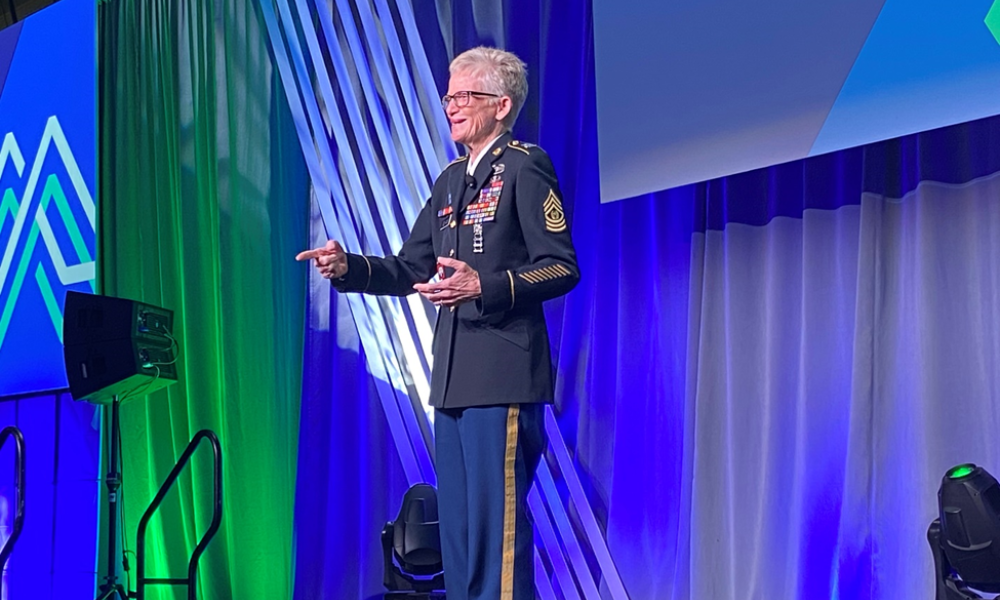Military veteran shares inspirational story of grit, gumption and responsibility

To say Command Sergeant Major Gretchen Evans did it all in her 27 years of military service would be an understatement. From basic army training, to working in top secret intelligence, to her career ending injury in Afghanistan, Evans knows a thing or two about making “the best decision for the greater good.”
Evans delivered an inspirational speech to hundreds of safety leaders at the Energy Safety Conference in Banff, Alberta on Wednesday. One of the main messages she shared is that every leader needs a rope team.
"What is a rope team? A group of people that you metaphorically have yourself tied to, that will get you to where you want to go,” explained Evans.
She talked about growing up in Texas, then going on missions in Grenada, Nicaragua, and Panama in the 1980s. Then Somalia, Kuwait, and Bosnia in the 1990s.
Then 9/11 happened. “It was a scary day,” she reminded the audience. It meant she was going to Afghanistan to fight the Taliban.
One mission saw her lead a team into a “really bad situation… absolutely horrendous chaos." They launched an attack on a Taliban stronghold in a mountain and it didn’t go as planned. Her unit was under heavy machine gun fire on one side and rocket attacks on the other, and they became heavily outnumbered with 13 team members facing 100 Taliban fighters.
At one point Evans didn’t think she would make it out of there, and says, “the only choice I really had was to go up the mountain." They began the climb, and three of her soldiers were killed immediately. But Evans couldn’t stop. "The best thing I could do as a leader was to say we're going to go out on our terms, with our heads held high." They made it up the mountain and were rescued by Apache helicopters.
In 2003, a US base in Afghanistan came under rocket attacks and a homemade explosive landed right beside Evans. "Three guys, part of my personal security detachment, took the brunt of that blast and were killed that day,” she said solemnly. The blast sent her flying into a cement wall while shrapnel shredded parts of her body and face.
Evans suffered a traumatic brain injury and was rendered permanently deaf. Her military career was over. “The transition was horrific,” said Evans. “I went into the military at 19 and I was wounded at 46. My whole adult life was in the military. That's all that I knew, and it was gone like that."
But Evans carved a path forward. She enlisted a service dog which helped her cope with hearing loss. Then she founded Team Unbroken. It’s a group of other wounded veterans who compete in grueling adventure races, where they put some of their military training to work. For Evans, Team Unbroken is another rope team.
A rope binds teammates together to climb mountains and cross rivers, ensuring everyone makes it across the finish line. "Sometimes you're the person on the ground and sometimes you're the person who's standing there for somebody else, and there's not a greater feeling than to be there for somebody else,” she said.
For safety leaders, creating a rope team can mean a lot of different things, but at the end of the day its about reaching the top of the mountain with others. "There is plenty of room at the top... take as many people with you as you can,” advised Evans, “because the beauty of being at the top is that you have people around you to share it with."
The climb is rarely easy, and we don’t always get to choose our team members, but Evans says, “we all get the same amount of grit and gumption.” Harnessing it is the challenge of safety leaders and “the burden of leadership is responsibility,” said Evans.
Who is on your rope team? And can you channel their grit and gumption to climb the mountain together?





